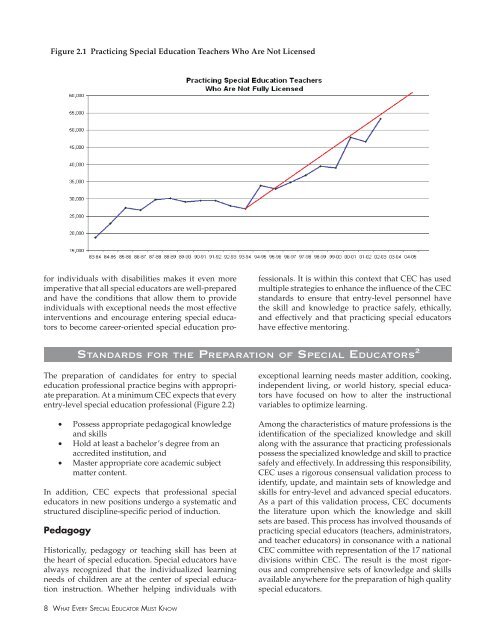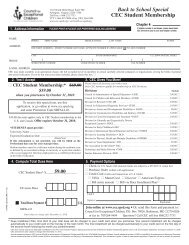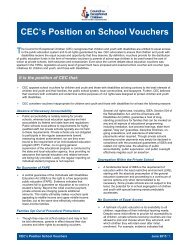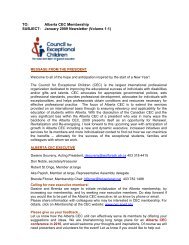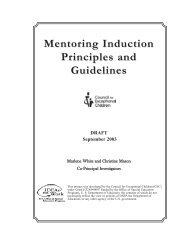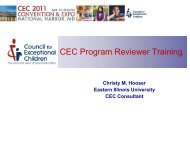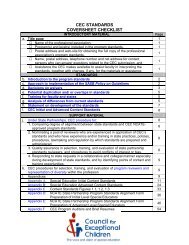What Every Must Know Special Educator - Council for Exceptional ...
What Every Must Know Special Educator - Council for Exceptional ...
What Every Must Know Special Educator - Council for Exceptional ...
You also want an ePaper? Increase the reach of your titles
YUMPU automatically turns print PDFs into web optimized ePapers that Google loves.
Figure 2.1 Practicing <strong>Special</strong> Education Teachers Who Are Not Licensed<br />
<strong>for</strong> individuals with disabilities makes it even more<br />
imperative that all special educators are well-prepared<br />
and have the conditions that allow them to provide<br />
individuals with exceptional needs the most effective<br />
interventions and encourage entering special educators<br />
to become career-oriented special education pro-<br />
fessionals. It is within this context that CEC has used<br />
multiple strategies to enhance the influence of the CEC<br />
standards to ensure that entry-level personnel have<br />
the skill and knowledge to practice safely, ethically,<br />
and effectively and that practicing special educators<br />
have effective mentoring.<br />
sTandards <strong>for</strong> The preparaTion of speCial eduCaTors 2<br />
The preparation of candidates <strong>for</strong> entry to special<br />
education professional practice begins with appropriate<br />
preparation. At a minimum CEC expects that every<br />
entry-level special education professional (Figure 2.2)<br />
• Possess appropriate pedagogical knowledge<br />
and skills<br />
• Hold at least a bachelor’s degree from an<br />
accredited institution, and<br />
• Master appropriate core academic subject<br />
matter content.<br />
In addition, CEC expects that professional special<br />
educators in new positions undergo a systematic and<br />
structured discipline-specific period of induction.<br />
Pedagogy<br />
Historically, pedagogy or teaching skill has been at<br />
the heart of special education. <strong>Special</strong> educators have<br />
always recognized that the individualized learning<br />
needs of children are at the center of special education<br />
instruction. Whether helping individuals with<br />
<strong>What</strong> EvEry SpECial EduCator MuSt KnoW<br />
exceptional learning needs master addition, cooking,<br />
independent living, or world history, special educators<br />
have focused on how to alter the instructional<br />
variables to optimize learning.<br />
Among the characteristics of mature professions is the<br />
identification of the specialized knowledge and skill<br />
along with the assurance that practicing professionals<br />
possess the specialized knowledge and skill to practice<br />
safely and effectively. In addressing this responsibility,<br />
CEC uses a rigorous consensual validation process to<br />
identify, update, and maintain sets of knowledge and<br />
skills <strong>for</strong> entry-level and advanced special educators.<br />
As a part of this validation process, CEC documents<br />
the literature upon which the knowledge and skill<br />
sets are based. This process has involved thousands of<br />
practicing special educators (teachers, administrators,<br />
and teacher educators) in consonance with a national<br />
CEC committee with representation of the 17 national<br />
divisions within CEC. The result is the most rigorous<br />
and comprehensive sets of knowledge and skills<br />
available anywhere <strong>for</strong> the preparation of high quality<br />
special educators.


